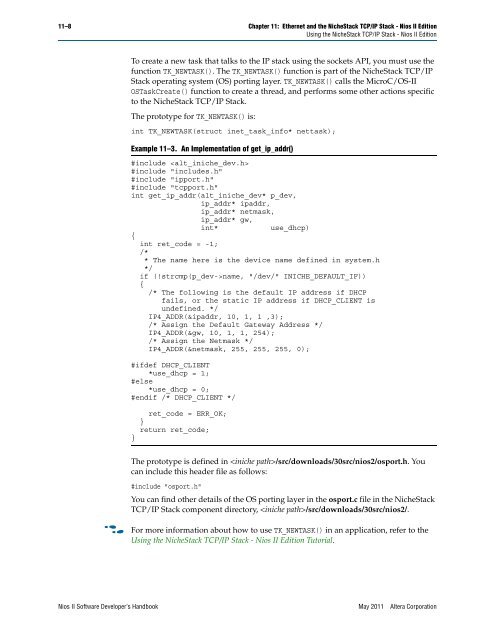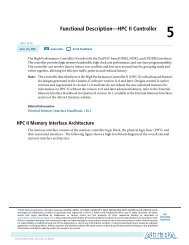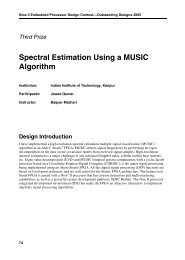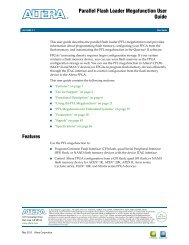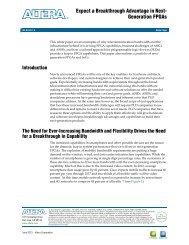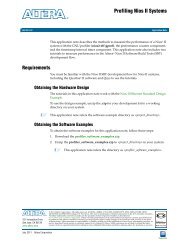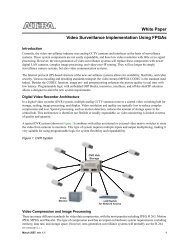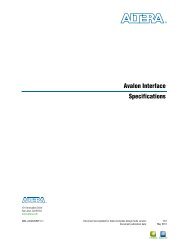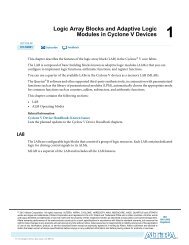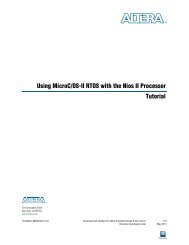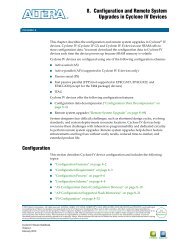Ethernet and the NicheStack TCP/IP Stack - Nios II Edition ... - Altera
Ethernet and the NicheStack TCP/IP Stack - Nios II Edition ... - Altera
Ethernet and the NicheStack TCP/IP Stack - Nios II Edition ... - Altera
Create successful ePaper yourself
Turn your PDF publications into a flip-book with our unique Google optimized e-Paper software.
11–8 Chapter 11: <strong>E<strong>the</strong>rnet</strong> <strong>and</strong> <strong>the</strong> <strong>Niche<strong>Stack</strong></strong> <strong>TCP</strong>/<strong>IP</strong> <strong>Stack</strong> - <strong>Nios</strong> <strong>II</strong> <strong>Edition</strong><br />
Using <strong>the</strong> <strong>Niche<strong>Stack</strong></strong> <strong>TCP</strong>/<strong>IP</strong> <strong>Stack</strong> - <strong>Nios</strong> <strong>II</strong> <strong>Edition</strong><br />
To create a new task that talks to <strong>the</strong> <strong>IP</strong> stack using <strong>the</strong> sockets API, you must use <strong>the</strong><br />
function TK_NEWTASK(). The TK_NEWTASK() function is part of <strong>the</strong> <strong>Niche<strong>Stack</strong></strong> <strong>TCP</strong>/<strong>IP</strong><br />
<strong>Stack</strong> operating system (OS) porting layer. TK_NEWTASK() calls <strong>the</strong> MicroC/OS-<strong>II</strong><br />
OSTaskCreate() function to create a thread, <strong>and</strong> performs some o<strong>the</strong>r actions specific<br />
to <strong>the</strong> <strong>Niche<strong>Stack</strong></strong> <strong>TCP</strong>/<strong>IP</strong> <strong>Stack</strong>.<br />
The prototype for TK_NEWTASK() is:<br />
int TK_NEWTASK(struct inet_task_info* nettask);<br />
Example 11–3. An Implementation of get_ip_addr()<br />
#include <br />
#include "includes.h"<br />
#include "ipport.h"<br />
#include "tcpport.h"<br />
int get_ip_addr(alt_iniche_dev* p_dev,<br />
ip_addr* ipaddr,<br />
ip_addr* netmask,<br />
ip_addr* gw,<br />
int* use_dhcp)<br />
{<br />
int ret_code = -1;<br />
/*<br />
* The name here is <strong>the</strong> device name defined in system.h<br />
*/<br />
if (!strcmp(p_dev->name, "/dev/" INICHE_DEFAULT_IF))<br />
{<br />
/* The following is <strong>the</strong> default <strong>IP</strong> address if DHCP<br />
fails, or <strong>the</strong> static <strong>IP</strong> address if DHCP_CLIENT is<br />
undefined. */<br />
<strong>IP</strong>4_ADDR(&ipaddr, 10, 1, 1 ,3);<br />
/* Assign <strong>the</strong> Default Gateway Address */<br />
<strong>IP</strong>4_ADDR(&gw, 10, 1, 1, 254);<br />
/* Assign <strong>the</strong> Netmask */<br />
<strong>IP</strong>4_ADDR(&netmask, 255, 255, 255, 0);<br />
#ifdef DHCP_CLIENT<br />
*use_dhcp = 1;<br />
#else<br />
*use_dhcp = 0;<br />
#endif /* DHCP_CLIENT */<br />
ret_code = ERR_OK;<br />
}<br />
return ret_code;<br />
}<br />
The prototype is defined in /src/downloads/30src/nios2/osport.h. You<br />
can include this header file as follows:<br />
#include "osport.h"<br />
You can find o<strong>the</strong>r details of <strong>the</strong> OS porting layer in <strong>the</strong> osport.c file in <strong>the</strong> <strong>Niche<strong>Stack</strong></strong><br />
<strong>TCP</strong>/<strong>IP</strong> <strong>Stack</strong> component directory, /src/downloads/30src/nios2/.<br />
f For more information about how to use TK_NEWTASK() in an application, refer to <strong>the</strong><br />
Using <strong>the</strong> <strong>Niche<strong>Stack</strong></strong> <strong>TCP</strong>/<strong>IP</strong> <strong>Stack</strong> - <strong>Nios</strong> <strong>II</strong> <strong>Edition</strong> Tutorial.<br />
<strong>Nios</strong> <strong>II</strong> Software Developer’s H<strong>and</strong>book May 2011 <strong>Altera</strong> Corporation


